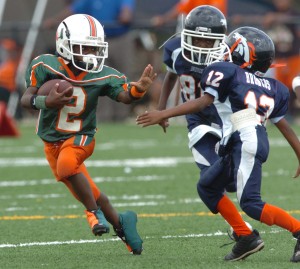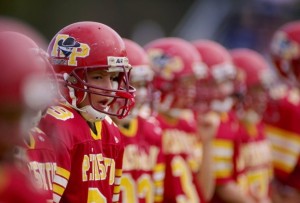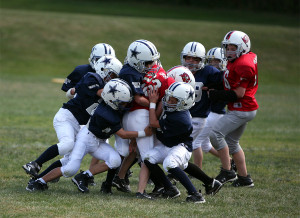The Beginner’s Beginner Guide to Fantasy Football
¡Hola, Schmamers!
Greetings and salutations from wherever it is that dead blog writers go. Or, rather, Earth because the rumors of our deaths have been greatly exaggerated. We are all alive and (mostly) kickin’.
As Josh said in the announcement of our impending triumphant return, one of the things Gamers Schmamers has in the ol’ pipeline is a fantasy football draft. Fantasy football started out as a tabletop game for those in the center of a Venn Diagram which combined People Who Love Sports and People Who Love Math. Since then, we’ve enslaved computers to do our every bidding so performing actual math is no longer necessary.
Well, fantasy football has managed (beyond all reasonable assumptions) to overcome the loss of copious amounts of statistics and remain popular. Popular enough, in fact, that in 2012 an estimated 24.3 million people played – including enough time playing in the office to account for $6.5 billion worth of man hours. Despite being free to play (minus optional league entry fees) in 99% of cases, fantasy sports raises an estimated $3-4 billion in revenue across all sports, when you account for factors like fantasy players being more likely to watch or even attend games than before they started playing fantasy.
We here at Gamers Schmamers want a piece of that pie consistently strive to bring you, our fans, what’s popular and interesting in gaming, so we’re bringing fantasy football to you! Without further ado, ladies and gentlemen, your 2013-2014 Schmamers fantasy football competitors:
- Andrew English
- Carina Skrande
- Corey Weber
- Haleigh Thomas
- Josh Hawks
- Michael Severson
- Mychael Stewart
- NPC Shopkeeper
- Patrick Simpson
- Paul Valentine
We’ve got a few quirks which will hopefully keep our season interesting, but before we get to the league we’ve got an issue: most of the members of our league haven’t played fantasy football, and some don’t even watch football. In other words, they don’t know what the hell they’re doing. Sure, ESPN put’s out a ton of material and if you have a enough time you can go through and learn a lot about the process before you begin. But are we really about promoting research here at Gamers Schmamers? Hell no – I didn’t look past the first two Google results in any of the articles I cited about fantasy football numbers. So to help out our new found football feuders I’m going to put together a few basic instructions for fantasy football, like, How Do I Even Play? What do I Do on Draft Day? Who Are Some of the Best Players? Can I trust Mike Shanahan or Bill Belichick To Coach the Redskins and the Patriots (Respectively) In a Manner That is Conducive To Setting My Fantasy Lineups?
The answer to the last question is no. The answer to the rest is below.

All pictures will be of Pee Wee football players, because they’re much cuter than millionaires who have been taking steroids for years.
How Do I Even Play?
Fantasy football is basically developing a team from a pool of existing football players, and then being awarded points for their statistical performances each week. There are many different scoring methods you can use, but the Gamers Schmamers league is going to use ESPN standard scoring, which is the default setting for any league started on ESPN.
There are some nuances to scoring, but essentially what you need to know is:
- a Rushing or Receiving Touchdown is worth 6 points
- a Passing Touchdown is worth 4 points
- Every 10 Rushing or Receiving yards are worth 1 point
- Every 25 Passing Yards is worth 1 Point
- An Interception or a fumble loses you 2 points
- Basically, if your D/ST (more on that later) gives up touchdowns or yards, you lose points
- A missed field goal loses you 1 point
So if you have a wide receiver who catches for 58 yards and scores one TD, he gets 11 points. If you have a quarterback who throws for 100 yards and 2 TDs he gets 12 points, while a quarterback who throws for 100 yards but rushes for 2 TDs gets 16. Just as a point of note – rushing TDs are almost always more reliable than receiving TDs, making them the most valuable commodity in fantasy football.
We’ll get into what you should do to make your team in the draft section, but for now let’s stick to the actions you’ll need to take to get your team going. I’m making this extremely basic so if you’ve played fantasy before there’s no need to read on.
Basically, you’ll just need to set your lineup each week. The Monday Night Football game goes towards the previous week’s scores, so the earliest you can set your lineup is Tuesday. Players can be moved out of any spot until kickoff of their game for the week, at which point they are locked in. Your team has spots for a quarterback, two running backs, two wide receivers, one tight end, a “flex” spot (which can be occupied by a running back, receiver or tight end) a spot for defense/special teams (more on that later) and a kicker. You’ll then have a group of “bench” spots, which are your inactive players. They’re points won’t go towards your score.
Games happen on Thursdays, Sundays and Mondays, with 90% of them being on Sundays. There will only be two teams playing on Thursday (the exception being Thanksgiving Day, which generally has two games) so if you don’t have a player involved in the Thursday night game you don’t have to worry about your lineup until Saturday. If you have a player going Thursday night, you can set the rest of your lineup later but just be conscious that you will not be able to move this player to a different spot.
You can technically set your lineups on Tuesday and forget about the team for the next week, but you’ll at least want to check on Saturday to make sure no players suffered injuries in practice. If possible, check the team right before kickoff of whatever games your players are involved in. NFL teams are required to categorize their injured players, so you’ll see reports on ESPN based on how likely they are to play – Probably, Doubtful or Out. Check the ESPN notes (if you see a note with an orange-ish asterisk next to a player, click it, that’s recent news) because sometimes a player listed as Doubtful will get definitive news about whether they’ll play or not before the game. A player listed as Out will definitely not be playing in that week’s game.
The other basic aspect of playing is waiver wire acquisitions. The waiver wire is the remaining pool of players that are not currently on a fantasy team. It’s called a waiver because initially certain teams (in reverse order of the standings) get a better chance at players on Tuesday night/Wednesday morning. So during the day Tuesday teams place “claims” on free agent players. That night (usually around 3AM Wednesday morning), whichever team is in last gets the player they wanted, then the second-to-last team gets the next pick, etc. So if the last place team and the first place team both try to get the same player, that player will go to the last place team. You can put claims on multiple players, listing them in order of priority for you. The computer goes down the rankings until all of the claimed players are acquired. Basically if someone lower in the rankings than you claimed the player, or if you put the player as your second priority and someone else has them as their first, you won’t get the player.
After this period on Tuesday, you can pick up any free agent you want at any time. However, you must drop one of your current players to do this (when you pick up a new player it asks you who you want to drop, and automatically drops that player when you get the new player. This is to prevent people from dropping someone to try and get a player, not getting that player and then being screwed). You cannot drop a player who is locked.
How do I win?
The scoring we use is head-to-head, which means you’ll be matched up against one team each week and you get a Win, Loss or Tie depending on how you fare against that team.
Reports that ESPN has done show that teams that win their matchups score an average of 94 points. So you want your players, in whatever combination of points as seen above, to equal out to 94 or higher each week.
ESPN gives you a projected score each week, which is basically where a panel of people who just pay attention to football statistics guess that player will score. You can set your lineup simply by arranging these estimates to give you the highest predicted outcome, if you want. ESPN also gives you a lot of information on your team page. For example, it will show you what percentage of fantasy players own each player, what percentage of players are starting them that week, how the defense they are playing against them perform (this is based on how many fantsy points the opponent gives up, for example, if it says a QB is playing against the 32nd ranked team, then the team he’s playing gives up more fantasy points to QBs than any other team.
At the end of the season (or the last four weeks of the regular season in the NFL, weeks 12-16), the teams who finish first in their respective divisions along with the next two best records make the playoffs. So technically the playoffs could consist of three teams from one division and one from the other. Usually it’s two and two, though.
The playoffs work exactly like the regular season, only matchups take two weeks and the person with the highest combined total wins that round. There’s two rounds, so the two winners of the first round face off to see who the champion is, while the losers play to see who gets 3rd and who gets 4th.
What do I do on draft day?
Draft day is probably the most intimidating thing for people who don’t play fantasy. If you watch the NFL you’ll have a general feel for who a good player is, though a great real-life NFL player doesn’t always translate to a good fantasy player . If you have no idea what you’re doing at all, the best advice is to just trust ESPN. They rank every player, and when you draft you’ll see the rankings for each player.
Technically, you don’t have to do anything to draft your team – if you just don’t pick a player ESPN will begin auto-picking for you. It’s best not to let this happen, though. ESPN always drafts the top ranked player left on the board regardless of position, unless that position is filled on your roster. For example, you can hold up to four quarterbacks on your team. I had one team that I missed the draft for; through the first six rounds, four different times a QB was rated highest on the board when my team came up, and the auto-pick took that player. So I ended up with four QBs, when the most you should probably carry is two. Meanwhile my other positions had sub-par players because the team overdrafted QBs early. It came in last place. So even if you do end up just choosing the highest ranked player each time, still show up to the draft to at least babysit ESPN.
You’ll notice that players have a number listed for “bye.” This is the week when their team will be on a bye to get some extra rest during the season. Bye weeks begin in week four, and obviously a player won’t score any points if he’s not playing a game. If you see that a bunch of the players you’re drafting all have the same bye week, don’t panic. Chances are you’ll make changes to the roster before the bye week anyway, so what you get on draft day doesn’t matter. And even if your lineup all clicks and you just stick with it, experienced players would rather give up a loss one week and get the players they want than try to draft so they only have 1-2 players on a bye every week.
The team you get on draft day will not be your final team if you want to win. You’ll need to grab players from the waiver wire who look like they’re better than what you have. Generally people won’t drop their top 5-6 round players, but sometimes if they suck enough you will. Just don’t have a quick trigger finger on the top picks (unless they get a serious injury) – the players were ranked high for a reason, and sometimes because of simple statistical variance players who usually dominate will go through several games in a row of sucking. Football is hard and very random.
There are some things you should keep in mind about a few positions:
Quarterbacks: If you take the time to look at who scored the most points last season, you’ll see that QBs occupy the top 5 or so spots. However, this does not mean that the first five players drafted should be QBs, because RBs are actually more valuable in the long run. A great QB might average 25 points a game, while an above-average QB might score about 20. Meanwhile a great RB might get around 20 points a game, while an above-average might score around 12. There also just aren’t as many above-average running backs as quarterbacks. Because of this bigger drop in value, RBs are considered a hotter commodity. However, if you see a QB ranked higher than a lot of RBs there’s probably a reason. Aaron Rodgers gets a lot of fantasy points in general; QBs like Robert Griffin III and Cam Newton get rushing TDs regularly enough to dramatically boost their value, etc. If you don’t have a QB and one shows up next in the rankings, don’t skip him for a RB. If you already do have a QB, then probably skip that one. You’ll want two QBs on your team, in case your starter gets injured and you have to make a last second switch.
Runningbacks: See backs, quarter. You’ll probably want 5-6. The good thing about running backs (and the next two positions we’ll discuss), is that if you get a guy low in the rankings and he ends up being awesome, you can use him in your flex spot and keep your other starters in. QBs, however, can’t use the flex spot.
Wide Receivers – There are a lot of good receivers this year, making them less valuable than running backs. Receivers games are more volatile than most other positions because they often depend on catching deeply thrown balls and their performance is tied very closely to the QB. Once you get out of the first tier of wide receivers, value will depend a lot on whether they score a TD or not.
Tight Ends: There are very few good fantasy tight ends, since a lot of the good real life tight ends just protect the quarterback instead of trying to catch passes. If you miss out on the top tier of guys it’s probably best just to wait. The top TEs have steadier production than WRs because their game relies more on shorter, more accurate passes. However, there are really only 3-4 truly elite TEs and after that it’s just a lottery game – if your TE gets a TD that week, you win at TE.
Kickers: DO NOT TAKE A KICKER UNTIL THE VERY LAST ROUND. Taking a kicker earlier is just a waste of time. Some kickers will perform better than others, and if yours has missed 15 of his last 20 field goals you should drop him, but generally a kicker’s performance varies so much that it’s impossible to predict. You will only want one kicker, and when he goes on a bye week don’t bother to put him on your bench – just drop him for another kicker and then keep that kicker. The spread in points will come out to 2-5 points a week, so which kicker you have barely matters.
Defense/Special Teams: The most confusing for last. Since assigning point values for an individual defensive player is hard, the standard ESPN setting is just to draft an entire team for this category. So any interception, fumble recovery, sack, punt return TD, kickoff return TD, etc. by anyone on that team gets points in this category. There are some really good defenses that are ranked high, but generally speaking I don’t take a D/ST until the second-to-last round. What I do is just never keep a D/ST for more than a week – I just look for D/STs on the waiver wire who are average or above average and are playing against a shitty offense and pick them up for the week. That’s harder to do if you don’t know the teams, though, so it might be easier to try and draft an elite defense and just play them all the time (minus the by week, of course).
Who Are the Best Players?
You can find a lost of the top 300 players according to ESPN here. But I’ll give you just a brief list below. I’ve given an asterisk next to players who are good but who have a history of getting injured often or had recent serious injuries, which can dramatically hurt their value. Don’t pass over a player in the draft just because of that, but keep in mind that if you draft an injury prone RB you may want to spend your next pick on a RB too to make sure you don’t lose all the production from your RB slots if the first player goes down.
Quarterbacks: Aaron Rodgers, Drew Brees, Peyton Manning* (although he played fine last season after his big injury), Tom Brady, Cam Newton, Matt Ryan, Colin Kaepernick, Robert Griffin III, Matthew Stafford, Russel Wilson
Runningbacks: Adrian Peterson, Arian Foster*, Marshawn Lynch, Ray Rice, Doug Martin, Jamaal Charles, C.J. Spiller, Trent Richardson, Alfred Morris, LeSean McCoy
Wide Receivers: Calvin Johnson, A.J. Green, Dez Bryant, Brandon Marshall*, Julio Jones, Demaryius Thomas, Roddy White, Vincent Jackson, Andre Johnson*, Randall Cobb
Tight Ends: Jimmy Graham, Rob Gronkowski*, Tony Gonzalez, Jason Witten, Vernon Davis
D/ST: Seattle Seahawks, San Francisco 49ers, Houston Texans, Chicago Bears, Cincinnati Bengals
Kickers: Seriously does not matter






